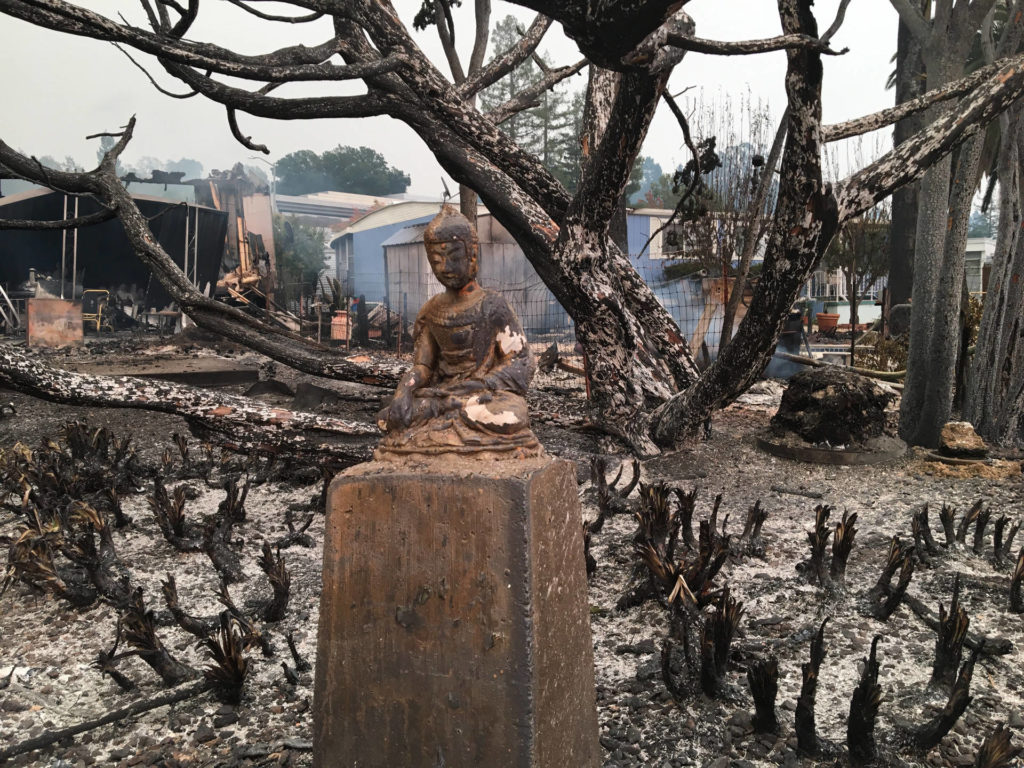
Photo Credit: Leslie Mclurg, KQED
In crisis situations–whether by human-made violence or natural disasters–we can draw from the tools of nonviolence to help us take care of ourselves and others with sensitivity and awareness.
The following list includes activities we can do by ourselves and share with others.
- Center. Take deep breaths to slow your breathing and to calm your mind. Take 15 seconds and check in with your surroundings: name to yourself or outloud five things you see: a red pillow, a grey chair, a tree, etc. You might also use a mantram, a prayer word that helps to calm the mind and body. Find one in your spiritual tradition, if you wish, such as Jesus Jesus Jesus, Allah Allah Allah, Rama Rama Rama (Gandhi’s mantram, which he called the “staff of his life”), Om mani padme hum, Baruch Atah Adonai, Ave Maria, etc. You can find a great list in The Mantram Handbook by Eknath Easwaran or online at BMCM.ORG/Mantram
- Check in with your body. Are you tense? Take 30 seconds, regularly, to stretch your arms, legs, notice your pace (is it unnecessarily fast?), rub your hands together, wiggle your toes, and so forth. Also, drink water. Stress can dehydrate us, fast; and as St. Exupery said in The Little Prince, “sometimes water is good for the heart.”
- One-pointed attention. There are a lot of things grabbing for our attention when we are in an emergency situation. Doing several things at once will not only fragment your mind more and make you feel more afraid, it will lead to less getting done. Try to do one thing at a time. Make a list (at least mentally, if you can’t write it down), you may have to “triage” to attend to first things first. Go through it systematically. Each thing you do, give it your full attention until you have finished doing it.
- Give people your one-pointed attention. Similarly, we can support the people around us who might be in a state of panic by giving them our one-pointed attention. Even if only for a short while, for whatever amount of time we have, be as present as possible with them. Plus, practice “deep listening.” When you hear what someone really wants (and they themselves may not be quite aware), it releases a lot of tension.
- Be creative, but be sensitive. In a time of crisis, we need each other and the various gifts we bring. Be creative and think of ways of building community based on what you know you can do. Help people to laugh and feel connected. But remember to be sensitive–look at what is happening, and consider what might be missing. People need safety, food, clothing, and shelter. We also need bonding, autonomy, and meaning. Don’t forget that human dignity requires all of these.
- Consent. Ask before you help. “Would you like me to help you with x?” Similarly with photographs. Respect people’s dignity and autonomy, always.
- Honoring our limits. There’s always something you can do, but it’s rarely everything. Take care of yourself so you can help other people, but don’t push them into accepting your help. Remember, you’re not helping because “you’re nice.” You’re helping because you’re a human being and it’s your nature to do so. You’re not alone. Reach out for support.
The Metta Center for Nonviolence is a Petaluma-based organization, whose mission is to support nonviolence worldwide.








